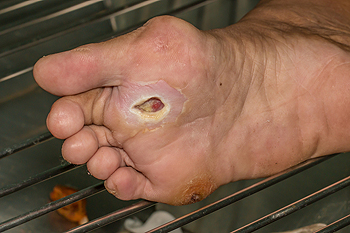
Dr. Kenneth Rosenthal
Dr. Jonathan C. O’Quinn
Dr. Michael J. Price

Dr. Kenneth Rosenthal
Dr. Jonathan C. O’Quinn
Dr. Michael J. Price
 Many diabetic patients are aware of the importance of properly taking care of wounds on their feet. Foot ulcers can be common in these types of patients, and can become worse as a result of damaged nerve endings that may accompany diabetes. This may cause the patient to lose feeling in the feet, making it possible that wounds on the feet are left undetected. If an existing wound becomes infected, it may develop into a foot ulcer. One of the first steps in treating a foot ulcer is to remove the affected wound tissue. This can be beneficial in helping the wound to drain, in addition to effectively examining the tissue that lies beneath it. Patients who have foot ulcers may be guided to wear a specific type of boot, or offloading device. This is a necessary step for successful healing. There are measures that can be taken which may help to prevent wounds on the feet. These can include examining the feet daily, washing and drying the feet thoroughly, and making sure blood glucose levels are within a normal range. If you have wounds on your feet, it is strongly suggested that you are under the care of a podiatrist who can help you to properly manage this condition
Many diabetic patients are aware of the importance of properly taking care of wounds on their feet. Foot ulcers can be common in these types of patients, and can become worse as a result of damaged nerve endings that may accompany diabetes. This may cause the patient to lose feeling in the feet, making it possible that wounds on the feet are left undetected. If an existing wound becomes infected, it may develop into a foot ulcer. One of the first steps in treating a foot ulcer is to remove the affected wound tissue. This can be beneficial in helping the wound to drain, in addition to effectively examining the tissue that lies beneath it. Patients who have foot ulcers may be guided to wear a specific type of boot, or offloading device. This is a necessary step for successful healing. There are measures that can be taken which may help to prevent wounds on the feet. These can include examining the feet daily, washing and drying the feet thoroughly, and making sure blood glucose levels are within a normal range. If you have wounds on your feet, it is strongly suggested that you are under the care of a podiatrist who can help you to properly manage this condition
Wound care is an important part in dealing with diabetes. If you have diabetes and a foot wound or would like more information about wound care for diabetics, consult with one of our podiatrists from Eastern Carolina Foot & Ankle Specialists. Our doctors will assess your condition and provide you with quality foot and ankle treatment.
What Is Wound Care?
Wound care is the practice of taking proper care of a wound. This can range from the smallest to the largest of wounds. While everyone can benefit from proper wound care, it is much more important for diabetics. Diabetics often suffer from poor blood circulation which causes wounds to heal much slower than they would in a non-diabetic.
What Is the Importance of Wound Care?
While it may not seem apparent with small ulcers on the foot, for diabetics, any size ulcer can become infected. Diabetics often also suffer from neuropathy, or nerve loss. This means they might not even feel when they have an ulcer on their foot. If the wound becomes severely infected, amputation may be necessary. Therefore, it is of the upmost importance to properly care for any and all foot wounds.
How to Care for Wounds
The best way to care for foot wounds is to prevent them. For diabetics, this means daily inspections of the feet for any signs of abnormalities or ulcers. It is also recommended to see a podiatrist several times a year for a foot inspection. If you do have an ulcer, run the wound under water to clear dirt from the wound; then apply antibiotic ointment to the wound and cover with a bandage. Bandages should be changed daily and keeping pressure off the wound is smart. It is advised to see a podiatrist, who can keep an eye on it.
If you have any questions, please feel free to contact our office located in Greenville, NC . We offer the newest diagnostic and treatment technologies for all your foot care needs.